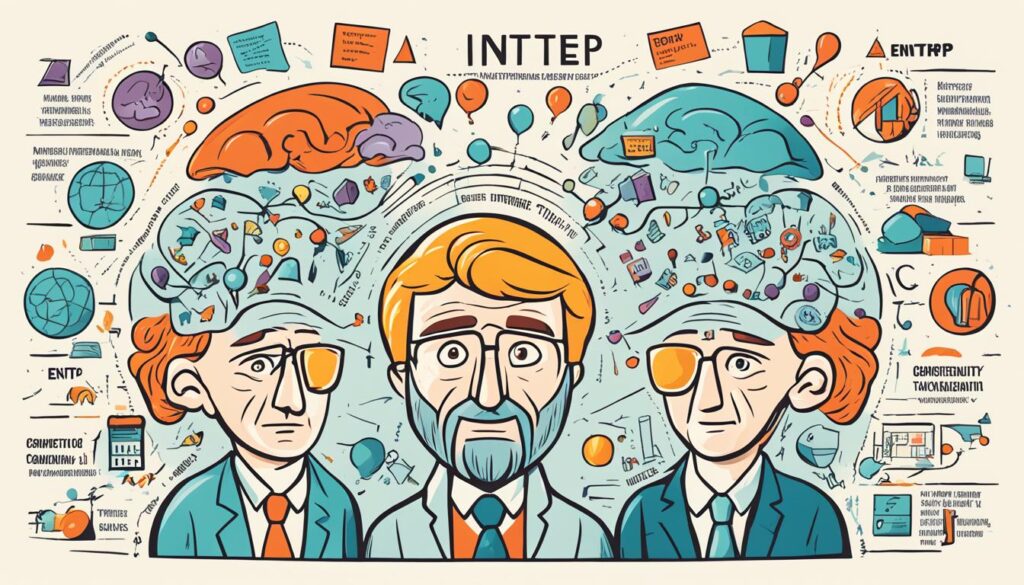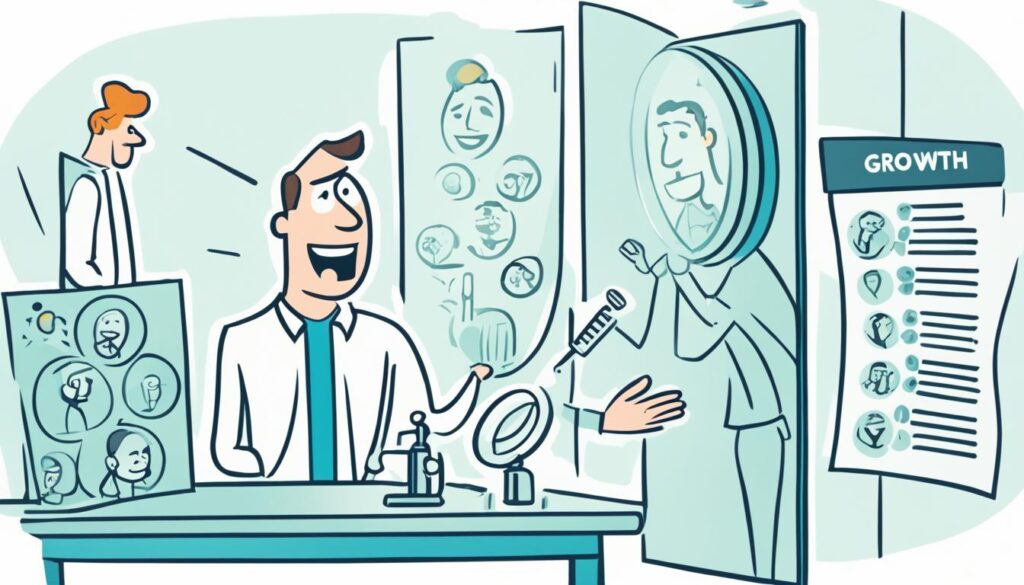Have you ever wondered what makes certain friendships so unique and strong, defying the odds of personality differences? In a world where compatibility is often sought after, there is a pair of personality types that form a conceptual bond, transcending the boundaries of conventional friendships. This intriguing pair consists of the ENTP (Extraverted iNtuitive Thinking Perceiving) and INTJ (Introverted iNtuitive Thinking Judging) types from the Myers-Briggs Type Indicator (MBTI).
Despite their distinct characteristics, ENTPs and INTJs possess a special dynamic that creates a unique and unparalleled friendship. But what exactly contributes to this conceptual bond between ENTP and INTJ friendships that sets them apart from others? Let’s explore nine factors that make this duo stand out.
Key Takeaways:
- ENTP and INTJ friendships form a conceptual bond that goes beyond conventional friendships.
- The Myers-Briggs Type Indicator (MBTI) categorizes ENTPs as Extraverted iNtuitive Thinking Perceiving, and INTJs as Introverted iNtuitive Thinking Judging.
- Despite their differences, ENTPs and INTJs share a strong friendship due to nine key factors.
1. Mutual Intellectual Stimulation
ENTPs and INTJs thrive on mutual intellectual stimulation, making their friendship a breeding ground for new ideas and thought-provoking discussions. Their compatibility in terms of personality traits creates the perfect environment for engaging conversations that not only challenge their minds but also strengthen their bond.
ENTPs, known for their quick thinking and curiosity, bring a constant stream of innovative concepts and perspectives to the table. They are natural explorers of new ideas, always pushing the boundaries of conventional thinking. On the other hand, INTJs, with their analytical and logical nature, provide a stable and grounded approach to these discussions. They dissect complex problems with precision and explore how these new ideas fit into a practical context.
Take the example of Jane, an ENTP, and Mark, an INTJ. Whenever they meet, their conversations revolve around a wide range of topics, from science and technology to philosophy and art. Jane brings up a revolutionary concept she read about, sparking Mark’s interest. They then delve into a deep analysis, discussing the potential applications and the impact it could have on society. These stimulating discussions not only broaden their minds but also intensify their connection.
| ENTP | INTJ |
|---|---|
| Logical and analytical | Analytical and logical |
| Thrives on new ideas and concepts | Brings practical context to discussions |
| Quick thinking and curious | Dissects complex problems with precision |
By engaging in these intellectually stimulating conversations, ENTPs and INTJs find a unique compatibility that fuels their friendship. Their shared love for new ideas and their ability to communicate effectively allows them to grow together intellectually and build a lasting bond based on mutual understanding and respect.
2. Debates and Discussions Over Various Interesting Concepts
One of the defining aspects of an ENTP and INTJ friendship is their ability to engage in debates and discussions over a wide range of interesting concepts. These conversations allow them to delve into thought-provoking topics and explore different viewpoints, fostering intellectual growth and expanding their knowledge.
ENTPs and INTJs thrive on the exchange of ideas, using their analytical minds to challenge each other’s perspectives and examine various subjects from multiple angles. Their dynamic conversations create an environment of intellectual stimulation and curiosity, keeping their friendship constantly evolving.
Whether it’s a lively debate on politics, the latest scientific breakthrough, or a philosophical discourse, ENTPs and INTJs value the opportunity to engage in deep discussions. These discussions serve as catalysts for personal growth, enabling them to broaden their understanding and refine their thoughts.
While debates and discussions can sometimes lead to disagreements, ENTPs and INTJs approach these conflicts as opportunities for learning and strengthening their bond. They understand that disagreements can lead to a deeper understanding of each other’s perspectives and better communication in the long run. Ultimately, their ability to engage in constructive dialogues sets the foundation for a robust and fulfilling friendship.

3. Challenging Each Other’s Perspectives and Viewpoints
ENTPs and INTJs have distinct cognitive functions that shape their perspectives and viewpoints. These thinkers approach the world from different angles, allowing them to challenge each other’s ways of thinking and broaden their understanding of the world.
ENTPs are known for their extroverted intuition (Ne), which enables them to generate a multitude of creative ideas and explore various possibilities. On the other hand, INTJs possess introverted intuition (Ni), which allows them to focus on deep insights and patterns.
These cognitive differences create a stimulating environment where ENTPs and INTJs can engage in thought-provoking conversations. By challenging each other’s perspectives, they push one another to consider alternative viewpoints and delve deeper into complex topics. This constant exchange of ideas fosters intellectual growth and expands their knowledge.
For example, imagine an ENTP and INTJ discussing a current social issue. The ENTP may present an unconventional viewpoint, urging the INTJ to see the issue from a fresh angle. In response, the INTJ might offer a well-reasoned counter-argument based on their analytical thinking. This exchange of differing perspectives encourages both individuals to reevaluate their initial assumptions, leading to a more nuanced understanding of the issue.
This image visually represents the concept of challenging perspectives and viewpoints. Just like the gears in the image, ENTPs and INTJs work together to turn and align their thoughts, exploring new angles and uncovering deeper insights.
| Challenging Perspectives and Viewpoints | Benefits |
|---|---|
| Exploring alternative viewpoints | Facilitates critical thinking and open-mindedness |
| Encouraging intellectual growth | Promotes self-reflection and curiosity |
| Expanding knowledge and understanding | Enhances problem-solving abilities |
- Challenging perspectives leads to personal and intellectual growth.
- Differing viewpoints foster critical thinking and open-mindedness.
- Exploring alternative perspectives broadens knowledge and understanding.
- Engaging in thought-provoking conversations stimulates curiosity.
By challenging each other’s perspectives, ENTPs and INTJs create a dynamic and stimulating friendship that encourages continuous personal and intellectual development.
4. Appreciation for Each Other’s Unique Cognitive Functions
ENTPs and INTJs have a deep appreciation for each other’s unique cognitive functions, which greatly contributes to the strength of their friendship. ENTPs possess extraverted intuition (Ne) and introverted thinking (Ti), while INTJs have introverted intuition (Ni) and extraverted thinking (Te).
These cognitive functions shape the way ENTPs and INTJs process information and make decisions, providing complementary perspectives that enhance their friendship dynamics. While ENTPs bring a creative and innovative approach to problem-solving through their extraverted intuition, INTJs rely on their introverted intuition to generate deep insights and forecasts.
Take, for example, a situation where an ENTP female and an INTJ male are brainstorming ideas for a new project. The ENTP’s extraverted intuition allows her to come up with a multitude of creative possibilities, exploring new avenues and pushing boundaries. On the other hand, the INTJ’s introverted intuition brings a depth of understanding and foresight, enabling him to analyze each idea’s long-term potential and weigh its feasibility.
This appreciation for each other’s cognitive functions creates a synergy that enables ENTPs and INTJs to tackle challenges from different angles, resulting in well-rounded and innovative solutions. They recognize and value the strengths that their respective cognitive functions bring to the table, fostering a deep sense of respect and admiration for one another.

| ENTP (Female) | INTJ (Male) | ||
|---|---|---|---|
| Extraverted Intuition (Ne) | Extraverted Thinking (Te) | Introverted Intuition (Ni) | |
| Introverted Thinking (Ti) |
- ENTP’s extraverted intuition brings creativity and innovative ideas to the friendship.
- ENTP’s introverted thinking allows for logical and analytical thinking.
- INTJ’s introverted intuition provides deep insights and forecasts.
- INTJ’s extraverted thinking brings structure and organization to the friendship.
This unique combination of cognitive functions enhances their ability to understand and relate to one another, contributing to the depth and richness of their friendship. ENTPs and INTJs value and leverage each other’s cognitive processing styles, creating a dynamic and intellectually stimulating bond.
5. Curiosity About How the Other’s Mind Works
In an ENTP and INTJ friendship, there is a natural curiosity about how each other’s minds work. Both personality types are intrigued by the cognitive processes and preferences of their friend, which leads to a deeper understanding of each other’s personalities and motivations. This curiosity fosters a sense of closeness in their friendship.
ENTPs and INTJs often find themselves pondering over questions like:
- What cognitive processes do they rely on when making decisions?
- How do they perceive the world and gather information?
- What cognitive biases do they have, and how does it influence their thoughts?
- How do their cognitive preferences shape their problem-solving approaches?
These questions reflect the genuine curiosity ENTPs and INTJs have about understanding the inner workings of their friend’s mind. By engaging in conversations and discussions about their cognitive processes, they gain valuable insights into each other’s unique perspectives and strengthen their bond.
“I’ve always been fascinated by how your mind works. Your ability to analyze complex concepts and approach problems from a different angle is truly remarkable.”
This curiosity about the workings of each other’s minds encourages an environment of open-mindedness and exploration, allowing both types to learn from each other’s cognitive strengths and develop a mutual appreciation for their unique approaches.
| ENTP | INTJ |
|---|---|
| Extraverted Intuition (Ne) | Introverted Intuition (Ni) |
| Introverted Thinking (Ti) | Extraverted Thinking (Te) |
6. Shared Enjoyment of Strategizing and Problem Solving
ENTPs and INTJs both possess a natural affinity for strategizing and problem-solving. They thoroughly enjoy working together as a dynamic duo, utilizing their unique strengths and perspectives to find innovative solutions. This shared enjoyment fosters a sense of camaraderie and teamwork.
“When it comes to strategizing and problem-solving, the ENTP-INTJ friendship is a force to be reckoned with. We thrive on the challenge of tackling complex issues and finding creative solutions. It’s amazing how our complementary skills and approaches merge into a powerful synergy.”
Together, ENTPs and INTJs form a dynamic duo that excels in strategizing and problem-solving. They combine their strategic thinking, analytical abilities, and creative minds to approach challenges from multiple angles. This partnership allows them to identify opportunities and devise effective plans of action.
Working together, ENTPs and INTJs create a powerful synergy. They leverage their MBTI types’ and personality traits’ compatibility to channel their energy into productive problem-solving sessions. Their mutual understanding and respect enable them to navigate through complex situations and generate innovative ideas.

ENTPs and INTJs complement each other’s strengths and weaknesses in strategizing and problem-solving. While ENTPs excel in generating new ideas and embracing risks, INTJs bring focus and strategic vision to the table. This combination allows them to tackle challenges with a systematic yet inventive approach.
The teamwork exhibited by ENTPs and INTJs is characterized by effective communication, efficient delegation of tasks, and the ability to leverage each other’s strengths. Their shared enjoyment of strategizing and problem-solving contributes to the deep bond they form as friends and colleagues.
| ENTP Strengths in Strategizing and Problem-Solving | INTJ Strengths in Strategizing and Problem-Solving |
|---|---|
|
|
7. Willingness to Consider Unconventional Ideas
ENTPs and INTJs share a common trait of being open-minded and willing to explore unconventional ideas. They value creativity and innovation, which allows them to embrace ideas that may seem peculiar to others. This shared openness contributes to the depth of their friendship.
When it comes to considering unconventional ideas, both ENTPs and INTJs possess a natural curiosity and a desire to push the boundaries of conventional thinking. They are not afraid to challenge the status quo or explore alternative paths. This openness creates an intellectually stimulating environment where both individuals can freely express their thoughts and engage in thought-provoking discussions.
The flexible nature of their personalities and their MBTI compatibility further enhances their willingness to embrace unconventional ideas. ENTPs, known for their adaptability and spontaneity, are open to exploring multiple possibilities and are willing to take risks. On the other hand, INTJs, with their strategic mindset and long-term vision, can appreciate the potential value of unconventional ideas and are not afraid to explore uncharted territories.
“The ENTP-INTJ friendship is a treasure trove of innovative and out-of-the-box thinking. We constantly challenge each other to question norms and explore unconventional paths. It’s like having a brainstorming session that never ends!”
The ability to consider unconventional ideas also extends to their communication style. Both ENTPs and INTJs are direct and straightforward in their communication, which allows them to exchange ideas and opinions openly. They appreciate honest and authentic conversations, free from unnecessary small talk or superficialities.
The willingness to consider unconventional ideas in their friendship not only fosters creativity and innovation but also strengthens the bond between ENTPs and INTJs. It encourages them to think outside the box, challenge each other intellectually, and grow together.
| Unconventional Ideas in ENTP-INTJ Friendship | Benefits |
|---|---|
| Exploring alternative career paths | Encourages personal and professional growth |
| Embracing non-traditional approaches to problem-solving | Opens up new possibilities and innovative solutions |
| Experimenting with unconventional hobbies or interests | Enhances their individuality and broadens their experiences |
8. Honest yet Constructive Feedback for Self-Improvement
ENTPs and INTJs prioritize personal growth and are aware of the importance of honest and constructive feedback in their friendship. They understand that providing feedback to each other is a valuable tool for self-improvement and fostering mutual understanding. Whether it’s pointing out areas of improvement or acknowledging strengths, their feedback is rooted in honesty and delivered with empathy.
In their dynamic duo, ENTPs and INTJs create an environment where hard feelings can be acknowledged and addressed in a respectful manner. They value open communication and recognize that constructive feedback is an essential aspect of personal and intellectual growth. Through their friendship, they actively challenge each other’s beliefs and behaviors, pushing one another to reach their full potential.

INTJ: “Your presentation was strong, but I noticed you struggled with structuring your arguments. Perhaps you could consider adding more supporting evidence to strengthen your points.”
ENTP: “I appreciate your honesty. It can be hard to receive feedback sometimes, but I know it’s for my own development. I’ll make sure to work on providing more concrete evidence in my next presentation.”
By fostering an environment of trust and respect, ENTPs and INTJs encourage each other to embrace feedback and view it as an opportunity for personal growth. They understand that receiving honest feedback can be challenging at times but recognize the potential for self-improvement it brings to their friendship.
9. Respect for Each Other’s Independence and Individuality
One of the key factors that contribute to the strong bond between ENTPs and INTJs is their deep respect for each other’s independence and individuality. They recognize the importance of personal space and autonomy, understanding that everyone needs time and freedom to pursue their own interests and recharge. This mutual respect allows them to maintain a healthy balance between spending time together and honoring each other’s need for solitude.
For example, let’s say you, an ENTP, have been invited to a social gathering with friends. While you enjoy these events and the opportunity to engage in small talk, you also appreciate your alone time to process your thoughts and recharge. Your INTJ friend, understanding your need for personal space, doesn’t pressure you to attend every social event, allowing you the freedom to decide when to join and when to take a break. This respect for your independence strengthens your bond and fosters a positive friendship dynamic.
In return, when your INTJ friend expresses a desire for alone time or declines an invitation to a social gathering, you respect their need for solitude without questioning or pressuring them. This demonstrates your understanding of their individuality and reinforces the trust and respect in your friendship.
FAQ
What is the MBTI compatibility between ENTP and INTJ friendship?
Despite their differences, ENTPs and INTJs can form a strong bond in their friendship. Their compatibility lies in their shared love for intellectual stimulation and their ability to challenge each other’s perspectives and viewpoints.
How do ENTP and INTJ friends engage in stimulating conversations?
ENTPs and INTJs engage in stimulating conversations by exploring new ideas, debating interesting concepts, and analyzing various topics from multiple angles. These discussions provide mental challenges and foster a deep connection between the two types.
How do ENTP and INTJ friends handle disagreements?
ENTPs and INTJs see disagreements as opportunities for growth and learning. They willingly challenge each other’s ways of thinking and explore alternative perspectives to develop a broader understanding of the world.
How do ENTP and INTJ friends appreciate each other’s unique cognitive functions?
ENTPs and INTJs have complementary cognitive functions that contribute to their friendship’s strength. They appreciate and value each other’s unique approaches and cognitive processing, which enriches their bond.
Why are ENTP and INTJ friends curious about how each other’s minds work?
ENTPs and INTJs are naturally curious about each other’s cognitive processes and preferences. Their curiosity leads to a deeper understanding of each other’s personalities and motivations, fostering a sense of closeness in their friendship.
How do ENTP and INTJ friends enjoy working together?
ENTPs and INTJs both possess a natural affinity for strategizing and problem-solving. They thoroughly enjoy working together as a dynamic duo, utilizing their unique strengths and perspectives to find innovative solutions.
Why are ENTP and INTJ friends willing to consider unconventional ideas?
ENTPs and INTJs share a common trait of being open-minded and willing to explore unconventional ideas. They value creativity and innovation, which contributes to the depth of their friendship.
How do ENTP and INTJ friends provide honest yet constructive feedback?
ENTPs and INTJs value honesty and are capable of providing each other with honest yet constructive feedback. They understand the importance of personal growth and are committed to helping each other improve.
What is the importance of respect in an ENTP and INTJ friendship?
ENTPs and INTJs have a deep respect for each other’s independence and individuality. They understand the importance of personal space and autonomy, allowing their friendship to thrive while respecting each other’s needs.